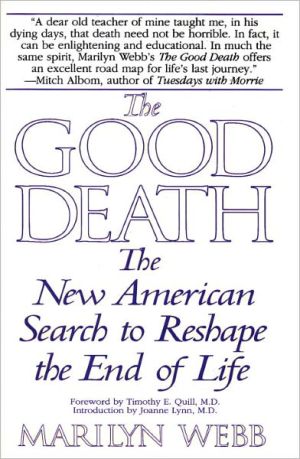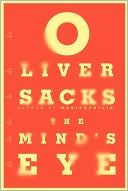The Good Death: The New American Search to Reshape the End of Life
Modern medical technology has lengthened our lives and forever altered how we face our deaths -- but it has also created painful dilemmas that lawyers, doctors, spiritual leaders, and, above all, patients and their families are struggling with every day. Now, drawing on more than six years of firsthand research and reporting, noted journalist Marilyn Webb has written the one essential book we need to understand these new realities -- and to take positive steps to improve the care of the...
Search in google:
Examines the legal, moral, and spiritual dilemmas created by modern medical technology. Women's Review of Books ...[A] journalist whose work is informed by painful private experience....[She] sat at deathbeds to learn how people really die and what [various groups] are trying to do about it.
In 1990, a man whom I will call D. Hale Cobb III died at the age of seventy-two of Alzheimer's disease. Hale had been the chief financial officer of a large corporation, known around New York City for his hilarious sense of humor and his flaming red hair. But over the previous eight or nine years, Hale had slowly begun to lose his mind. During his final two years, he was unrecognizable as the man he had once been: wheelchair bound, incontinent, tending toward violent words and behavior, howling at lights and at the moon. He recognized only his wife, Sally, and then just intermittently. It was as if he'd been invaded by the Body Snatchers; he looked the same, but an alien had entered the family home.\ Alzheimer's is a progressive neurological disorder that slowly disables the brain, first eroding memory, then slowly wiping out other brain and bodily functions until death occurs. It is incurable, and its timetable is both slow and unpredictable.\ In 1976, shortly after Hale took early retirement from his corporate job, he'd had a severe gall bladder attack. A year later, he developed prostate cancer. Both times he'd had emergency surgery and both times he'd needed Sally to take care of him afterward. But in 1983 or 1984, there was something else, something subtle.\ Hale's son and three daughters, and his stepson and two stepdaughters, all noticed the change separately--it took two years before Sally could admit it. She made excuses, trying to convince herself that Hale was merely aging.\ At that time, Hale was around sixty-five. Sally, his second wife, was in her early fifties, and they had been married fifteen years. Hale's first wife had died of cancer years before; Sally's first husband had died in a disastrous boating accident. Sally was still working in the public relations department of a museum, a job she loved.\ "In retrospect," Sally says, "I think that's when he must have begun getting sick. He pressured me to stop working. He was already becoming forgetful, and he wanted me home more, he felt better with me around the house."\ It was the little things at first. Hale misplaced his glasses. He lost his keys, his scarves, his umbrellas. He repeated himself, told the same jokes, asked the same questions over and over. He forgot phone numbers, addresses. He forgot words in the middle of sentences. Soon he began to lose socks or shirts he'd just taken out of drawers. Then he made lists to remember things, and he started to lose the lists.\ By early 1986, it was hard even for Sally to toss off his memory loss as aging. He'd begun to lose things he'd spent his entire career carefully guarding--his appointment book, his checkbooks, his financial statements, his wallet, even some valuable bonds he'd just taken out of the safe deposit box. By the end of the year, he was forgetting to take turns on his regular routes. He drove down wrong streets, got on wrong trains. He became disoriented, lost his way home from the local store in their suburban Connecticut neighborhood.\ Sally put off asking Hale not to drive for fear of hurting his manhood. But in late 1986, Sally discovered that he was paying their bills many times over; they were losing thousands of dollars each month. Sally began paying the bills herself. Then he got lost on their regular drive to their country home in Vermont. Finally, something happened that was hard to miss--Hale ran over the neighbor's dog. Sally worked up the courage to take away his car keys and hide them, knowing he never would find them.\ One spring night in 1987, Hale's granddaughter got married. It was a large, very elegant garden wedding held in a large home on the shore, with lawns that rolled down to the Long Island Sound. Many of Hale's former business associates were there. As they sat down to a formal dinner, at a table set with crystal and china under a white tent, Sally tried to pretend everything was okay as Hale began to drool and curse and make inhuman noises. He was unable to cut up his meat and began throwing his peas at the guests.\ "After dinner," Sally says, "when he started ranting at a man who'd been his longest, closest friend, I realized completely how sick he was. We had had a lot of friends, but after that they started going away. I also realized that our youngest grandchildren stopped wanting to come to visit." They said they were scared. Sally was devastated.\ Soon after that, Hale began having trouble walking and needed a cane. Then he began waving his cane at her and threatening violence. Sally knew she needed help, and she began to confront the realities of her situation.\ Sally wanted to hire an experienced nurse, but she soon discovered that their health insurance (a policy that at the time was actually the very best there was) and Medicare would cover the cost only if Hale needed skilled nursing care--help with such things as IVs or catheters--rather than custodial care, which is how they defined the day-to-day assistance Hale needed.\ In August 1987, Sally hired round-the-clock nurses from a local registry and paid for them herself. "I had two people every day," she says. "One from 4 P.M. to midnight at $140 a day, and the other from 8 A.M. to 4 P.M., also for $140, so it was $280 every day. From August 4, when they started, to November 7, 1987, I spent $17,560." The Cobbs weren't poor, but when she got a financial consultant to help her sort out their expenses, Sally realized she couldn't afford a private nurse for very long. She looked around for a less expensive solution and settled on a live-in aide.\ The first two aides, hired from home-care agencies, were disasters. One was verbally abusive to both Sally and Hale, and Sally suspected the second one of stealing. The third, the one she finally hired, was the aunt of Sally's cleaning lady--a kindly woman with no citizenship papers, but a big and willing heart. Sally paid her room and board and $300 for five days a week. On the weekends she hired a second aide for $160 for each two-day shift.\ Ironically, when Hale was in his prime, he'd considered himself wealthy and had been proud of his financial success. He'd wanted to provide for Sally, to leave money to each of the children and grandchildren, to leave a small amount of money to the museum where Sally worked. And yet, even with their substantial investments, Sally would not be able to afford long-term care for any prolonged period of time. Their children also worried that the costs of Hale's care might be so great that Sally might use up their joint marital assets and then find herself with little to live on in her own final years.\ They went to an attorney in a new, specialized field called elder law, who told them that Medicaid--the federal medical funds set aside to cover indigent Americans--would cover Hale after he had "spent down" all but a designated amount of his savings (their home was exempt). In order to retain any funds for Sally, however, they would have to legally divide their assets--half to Sally and half to Hale--no later than two years before Hale might need nursing home care. (This regulation was obviously designed to prevent people from going on Medicaid.) Failing that, Sally could divorce Hale and divide their assets that way.\ Sally was horrified. Hers was a generation of women who stood by their men. She would never divorce Hale, but she was finally persuaded to divide their assets. The lawyer told her to spend money on Hale's care only from the share that was his. But she didn't always listen and spent hers too, feeling the need to protect him. In any case, Hale needed nursing-home care before the two-year waiting period was up.\ By New Year's of 1989, Hale was having crisis after crisis. The prostate cancer returned. He began having kidney stone attacks, the beginnings of heart failure, pneumonia. Each time, the family doctor put him into the hospital and aggressively treated him. Not everything was covered by health insurance or Medicare. So Sally paid. There were deductibles, medications, papers to fill out, insurance clerks to call. And call. And argue with. Sally grew more exhausted, and though she refused to talk about it, their sons and daughters began fearing that Hale would soon need a nursing home and that Sally's health might also give way.\ By the spring of 1989, Hale began waving his cane not only at Sally but at their children and the older grandchildren, threatening violence, yelling obscenities, and throwing food at them. He smashed the downstairs TV. He tried to hit the aide and cursed at her. He tried to hit Sally. And she tried to deny it. She'd say "He didn't mean it," or "He's sick." She tried to be brave. But to watch Hale was to wonder at what point a human body ceases to be truly human.\ By summer, he could no longer walk even with the cane or with a walker and he couldn't get up or down the stairs. He would fall in a ball onto the floor, and just lie there, howling, in a rage. Sally was athletic. She rode horses three times a week and swam on the days in between, but she permanently injured her back trying to lift him. Day and night he wandered around the house. He opened doors while she slept and wandered out. She stopped sleeping, afraid he'd get lost or fall in the nearby lake or get hit by horses along the horse trail near their house. Then he became incontinent.\ He'd urinate or defecate wherever he went, whenever he felt the need. Sally didn't want to wound his pride by buying diapers. She and the aide decided they would take turns sleeping. They followed him around, brought him back, cleaned him up, cleaned the rug, wiped the floor. The doctor began to prescribe sedatives to quell his rage, but his cursing and violent threats continued. Sally was scared that anyone should find out about the abuse, although now only a handful of friends dared visit.\ Still, each time Hale became physically ill his doctor called in specialist after specialist to treat him, just as he might have if Hale had had any real hope of being cured. Gastroenterologists, cardiologists, internists, surgeons, oncologists, urologists. These doctors said his prostate was fine, though it seemed as if they were treating him for cancer. No one ever mentioned the C word. Even more important, none of these doctors acknowledged the fundamental truth: Cancer or not, Hale Cobb had lost his mind.\ Only that summer did any doctor admit that he probably had Alzheimer's. But the Cobbs' children knew all along. They also knew that Hale had always said that if he lost his mind, he would never want to live. Even now, whenever he could manage a coherent sentence he would say, "I want to die," but his doctor only began to give him antidepressants.\ As Hale's physical ailments became more frequent, his children began to ask his doctor: "What's the point of aggressively treating one illness after the next? What is he coming back to? If he's cured of this, won't he still be a man without a mind? Isn't pneumonia supposed to be an old man's best friend?"\ Sally was more hesitant. She, too, knew that Hale never wanted to live like this, but she was of the generation that venerated doctors. She'd always thought that one should care for one's spouse as much as one possibly could. Yet Hale seemed to be suffering needlessly.\ Hale's doctors weren't hesitant at all. Whenever his family asked them to stop aggressive treatment, to stop scheduling surgeries for heart problems or fighting pneumonia, the family doctor--and the specialists he brought in--accused them outright of wanting to murder him. One doctor finally asked his incredulous wife directly, "What? Are you trying to kill your husband?" Sally just cried.\ Before Hale's first wife died she had begged doctors to stop treating her cancer once she saw that the treatments were hopeless. After she died, Hale told anyone who would listen that he'd made a big mistake letting those useless treatments go on, and said that if this kind of thing were to happen to him, please, just let him go. But Connecticut did not have a living-will or health-care proxy law until 1991. By that time, Hale had already died.\ One night in the fall of 1989, Sally woke up terrified. Hale had gotten out of bed and collapsed unconscious on the bedroom floor. Frantically, she called 911. The ambulance came for him. Once he was in the emergency room and admitted into the hospital, doctors went full tilt to save him. State and federal law required them to do so.\ Sally hadn't known all that, but if she had it wouldn't have mattered anyway. As with most caregivers, her middle-of-the-night instinct was to call 911. She didn't realize that if she called, doctors would "do everything possible" to save him, even if "everything" wasn't really what she wanted them to do. And if she had realized, she would have called anyway. She could not have sat and watched Hale die on the floor.\ This time Hale's sons and daughters made a special plea. Among them were a psychiatrist, a media executive, a college history professor, a special education teacher, a Wall Street analyst. They were PTA presidents and Ivy League graduates, professionals who were married to professionals; they were accustomed to making the system work for them. They asked the doctor not to give Hale antibiotics, not to do any surgery, not to give him fluids. They wanted Hale just to have pain medications to keep him comfortable and let him go. But his family doctor and the specialists he enlisted refused.\ These adult children insisted that if things kept on, Sally might be so worn down that she would be the first one to die. They saw Hale's medical treatment as no different from physical abuse. One son, speaking on behalf of Hale's family, threatened to sue the doctors and the hospital for physical and emotional assault and battery, but he and his siblings backed down when they realized that Sally was too distraught to withstand a trial.\ Demented as he was, Hale tried to pull out his own IV and catheter tubes. His children and stepchildren and their spouses all thought he was trying to make his wishes clear in whatever way he could. The hospital staff tied his arms to the bed. Finally, Hale was medically stabilized. His doctor told Sally that it was time for a nursing home. Hale had always told everyone he never wanted to go to a nursing home, that he hoped he would die long before that.\ Sally was torn. She wanted to take care of him, but she wasn't physically able to anymore. Hale had been a dignified man, and now everything about his condition was so undignified. It was as if the real Hale had actually died years before. The doctor gave Sally some Valium to calm her down. Then she said she'd look around.\ It took time to find Hale a nursing home bed. Sally said that she'd consent to a home only if they could find a place nearby, so she could be with him every day. She didn't want him to go; she felt guilty, responsible, dutiful. Finally she reasoned that he'd only be sleeping in the home, that professionals would be caring for him, and that she'd be with him all the time anyhow, just as before.\ Meanwhile, the family was told that Hale had to leave the hospital. He had used up the Medicare days allotted for intestinal bleeding, and there was nothing more they could do to treat him. Since he didn't yet have a nursing home room, he was taken by ambulance from the hospital back home, and put to bed in his and Sally's room.\ That's when all five of Hale and Sally's daughters and stepdaughters and one daughter-in-law decided to come--from Maryland, from New Hampshire, from Texas, from the suburbs of Chicago and New York. They came together as women--without their husbands and children--for the first time in many, many years.\ They spent nearly a week spelling Sally in caring for Hale, sitting up late together in the living room, and spending long hours talking around the old, round kitchen table. The normal issues in their lives seemed to evaporate as they focused intently. They realized how very desperate Hale's situation was and the enormity of care that Sally had been trying to provide. Finally, a consensus among the daughters, at first emotional and unspoken, boiled to the surface. It was as if in this state--all female, all daughters, all unleashed from the moorings of what others might say is just or right--a higher sort of rightness took over.\ The night before he was to go into the nursing home, Hale lay under a cream-colored down comforter in his and Sally's antique, four-poster bed, moaning in apparent pain. He recognized no one. The daughters called another doctor for advice, a friend of the family who was a hospice physician. He had told them that in hospice it's common to increase the pain medication when it's clear that someone is in terrible pain and ready to go (though he didn't say whether that meant "ready to die" or psychologically ready). They thought Hale was as ready as anyone, and they decided to help him.\ They called Hale's own doctor and asked him for pain medication. He told them he would write a triplicate prescription for Demerol and they should come pick it up. "How many of these pills would be so much that it would kill him?" they asked. And the doctor told them how much was too much, so they'd "be sure not to exceed that dose."\ Hale had always loved homemade applesauce. While one daughter went to the drugstore to fill the prescription, another stopped at a local gourmet shop and bought organic Granny Smith apples. The daughters and the stepdaughters and the daughter-in-law gathered downstairs in the kitchen. They peeled and cored the apples one by one, cut them into one-inch chunks, and boiled the chunks with lemon juice, sugar, cinnamon, nutmeg, and a little vanilla. Then they dumped the entire bottle of Demerol onto the butcher block counter, mashed up the pills by grinding them between two spoons, scooped up the powder with a butter knife, and blended it in with the applesauce, stirring constantly.\ They wanted to be sure the mixture wouldn't burn Hale's lips, so they waited until it cooled slightly. Then two daughters sat on either side of their father in the bed, and two stepdaughters sat by his legs. One daughter and the daughter-in-law took turns stirring the pot down in the kitchen, to keep it warm--the way Hale liked it--and to maintain its potency. They shifted positions, all of them switching off with each other. Hale's head rested on three pillows, his thin face surrounded by 330-thread-count linens trimmed in delicate lace. They kissed and stroked and talked to him. His own daughters talked most--of their childhood, their mom, how much they loved him. All of the women told him they loved him. He didn't know who they were, not even his own daughters, but he seemed comforted.\ Then his daughters explained what they were about to do and Hale began to open and close his mouth. There was something there inside his brain, but it was hard to tell what. Suddenly he whispered. "Go," he said, "I want to go." He opened his mouth like a baby wanting to be fed. Those were the last intelligible words he ever said.\ One daughter, then another--daughters and stepdaughters and daughter-in-law--began spooning the drug-laced applesauce into his mouth. Sally stayed on the third floor, collapsed in sleep in one of the guest rooms, knowing, but not really wanting to know, what they were doing. Hale wasn't able to swallow very well by then, so the applesauce began dribbling out the corners of his mouth, down his cheeks and chin. They worried that he'd choke. They sat him up. They wondered why they were worried, when what they wanted was to help him go. All six of them cried and cried.\ They stayed up all night, and by morning, Hale was still breathing. As the nursing home attendants came in with their gurney and wheeled him off, they were consumed with a terrible feeling of defeat. They felt they'd let him down. Luckily for them, no one did any blood tests when, in late October 1989, D. Hale Cobb III was admitted.\ That had been Hale's--and the family's--last best chance. Once Hale became a nursing home patient, he could no longer have his own family physician. When Hale entered the home, he was assigned one of their doctors. Sally was asked if she wanted a doctor who would "do everything possible" for him. She said yes.\ She didn't understand medical euphemisms. The new physician was even more aggressive about prolonging treatment than their family physician had been. To Sally and the children, "doing everything possible" meant taking good care of Hale and keeping him free of pain or other uncomfortable symptoms. But after they realized that wasn't what the doctor intended--that he'd meant far more than that--they were not permitted to change physicians.\ Hale stayed in that nursing home--an expensive private nursing home in an exclusive Connecticut neighborhood--for ten months. Medicare and the health insurance policy that Hale and Sally had both had a per diem coverage; even together that rate was far lower than what Sally had to pay.\ Hale recognized no one. The only thing he could still do was sing old songs with Sally. She liked that, because it made her feel the warmth of still having a spouse she loved. They would sit holding hands as they sang. For some reason, the memory of old songs was the only part of Hale's brain still alive. The rest of the time he was nearly an animal.\ He was often strapped to his bed or his chair. He was diapered. He cursed and yelled and wailed. He was more violent than ever. Each time he got ill, they'd rush him to the hospital to be treated. It was always the same thing: antibiotics, fluids, heart medications, whatever they needed to do to keep his body alive, despite what Hale's family might say. And then they'd return him to the home, always worse than when he left.\ In September 1990, Sally's brother persuaded her to visit him and his family in Maine for a weekend. They'd tried to get her to visit for two years but she'd felt guilty about leaving. Hale had just been sent to the hospital for pneumonia, treated, and returned to the nursing home--this time nearly unconscious, almost totally unable to swallow, and with tubes coming out of veins in his legs and arms. This time, in her exhaustion, Sally said yes.\ While she was in Maine, Hale's son came to see him, as he'd promised, so Hale wouldn't be alone while Sally was gone. Hale died during the night, after his son spent the day with him, holding his hand as he lay in bed.\ The morning of the funeral, as the children gathered around the kitchen table again--this time with Sally--they got into a big fight. Feelings that had been building all those years Hale was ill finally burst out. Hale's children accused Sally of holding on to him longer than she should have. Sally said she loved him; she hadn't known how to get the nursing home to stop treating him; she couldn't not rush him to the hospital whenever he got sick.\ His children said they did not understand why Sally had a physician who was as aggressive about treating Hale as the nursing home's doctor was, nor why she couldn't just change doctors. They accused her of being selfish in wanting Hale to continue being treated.\ Sally's own children were angered both by these attacks on their mother and by the physical and emotional toll the whole situation had taken on her.\ And the financial burden had been staggering. By this time, Sally had spent what would have been Hale's entire share of their joint marital investments on his care, except for his portion of the house where she still lived. During his final year and a half, Sally had also spent $100,000 of her own assets on his care. The nursing home alone cost $72,000 a year, not including many doctors' bills, which somehow didn't seem to all be covered, nurses' aides and private nurses whenever he went into the hospital, since she felt the regular nursing staff needed help with the intensity his care required.\ In the end, it wasn't clear what was or wasn't covered by Medicare or the private health insurer. The mountain of paperwork required for reimbursement simply overwhelmed Sally. She worked at it diligently, but she probably failed to claim some reimbursements that might have been covered; her health insurance would pay after Medicare covered a portion, and after the health insurance sent a check, she often would have to file multiple appeals. Weary and under stress, Sally filed claims; but she also just paid.\ "I foolishly listened to Hale when he kept pushing me to stop working," she says, "and I lost a lot of money because of that. If I'd worked five years more I would have had a much better retirement package and I could have built up our savings even more." But by then, the Hale she had known was gone, and their investments were mostly used up. He'd wanted to leave his wife and his children well off, but now his children would get nothing, and Sally was left with little more than their home when he died.\ Instead of a legacy of wealth, Hale's long and frightful dying process left his family a legacy of sadness. The resentment Hale's children felt toward Sally for what they believed was her role in extending his life into indignities he'd never wanted created a permanent rift that has carried on to the grandchildren as well. Sally's children are equally as angry at Hale's children. They are all still polite to one another, but in the end Sally was left grieving not only the loss of her husband but the loss of family closeness and of the solid financial base that she and Hale had spent a lifetime building. The way Hale died left his wife in financially reduced circumstances and ripped apart the family support she would need for her own aging.
AcknowledgmentsForewordIntroductionA Personal Introduction1Dying Well: The Death of Judith Obodov Hardin12The Sorcerer's Apprentice: Beyond the Age of Medical Miracles283Dying Hard: The Death of Peter Ciccone544When Death Becomes a Blessing: The Problem of Pain815Tough Love: The Legacy of Karen Ann Quinlan1266Who Decides? Law and Politics at the Edges of Life1547Bearing the Burden: Families in Distress1928Hospice: The Birth of the Modern Art of Dying2189New American Sacred: The Return of Prepared Dying25010Wisdom's Portraits: Midwives at Death's Door28611Dr. Kevorkian's Challenge: Two Deaths in Michigan32112Assisted Dying: The Search for the Least Worst Death361Conclusion: Toward a New Kind of Hope397Epilogue: The Good Death of Jack Sheedy407Notes421Index473
\ Women's Review of Books...[A] journalist whose work is informed by painful private experience....[She] sat at deathbeds to learn how people really die and what [various groups] are trying to do about it.\ \ \ \ \ Journal of the American Medical AssociationThe Good Death is a refreshing departure from the spate of average books on the topic that have surfaced in recent years. Webb's scholarly approach to one of the greatest of all taboo subjects has resulted in a valuable resource and emotional guide to dying in America. With an already aged population and a large baby boom cohort passing through the sixth decade of life, a great many people of all ages would benefit from this thoughtful approach to reshaping the end of life. Transforming death to a subject discussed openly by the dying, their families, and the medical community is the greatest value of this book. The Good Death receives my strongest endorsement and should be read by physicians and laypersons alike.\ \ \ Publishers Weekly\ - Publisher's Weekly\ Beginning with accounts of the deaths of her sister and father, and moving through the recent unanimous Supreme Court judgment against states allowing physician-assisted suicide, Webb, a former editor at Psychology Today and McCall's, deftly analyzes the major themes in the contemporary debate about how, where and when we can, and should, die. For Webb, the evolution of medical technology that can prolong life beyond a patient's desire for it has touched off a search for a "New American Sacred" that physically, mentally and spiritually prepares one (and one's family and community) for death. She debunks tabloid misconceptions about notorious "right-to-die" cases like Karen Ann Quinlan and Nancy Beth Cruzan, and presents the work of dominant thinkers in the arena of death studies, like Elisabeth Kbler-Ross, and protagonists in the physician-assisted suicide movement, like Jack Kevorkian. Further insight may be found in her descriptions of various terminal journeys, where we learn of the value of family preparation and participation in the last acts of the dying, and of the healing and even joy that ritual can provide for survivors. Even when the instances portrayed depict the worst end-of-life care, with patients wracked by pain in over-medicalized surroundings, Webb never becomes maudlin. "I have come to deliver a simple message," said an oncologist at a conference attended by the author, "You don't have to be a Tibetan Buddhist to die well." This book goes far to explain why. (Oct.)\ \ \ \ \ Women's Review of Books...[A] journalist whose work is informed by painful private experience....[She] sat at deathbeds to learn how people really die and what [various groups] are trying to do about it.\ \ \ \ \ Kirkus ReviewsAn impressive attempt to clarify the complex political, ethical, legal, and medical factors impacting the American way of death and care of the dying.\ Originating as an article called "The Art of Dying" for New York magazine, this work draws on research into both the dying process and the right-to-die controversy. Webb, a former editor-in- chief of Psychology Today, argues with considerable passion and great effectiveness that "if we are to have good deaths, the culture of dying must change." She attended medical training seminars, visited hospitals, hospices, and palliative-care centers, and interviewed numerous dying patients and their families, doctors and clerics, lawyers and ethicists, conservatives and liberals, and such prominent figures as Dr. Jack Kevorkian and Elizabeth Kübler-Ross. That dying well is possible is shown in her first chapter, featuring a young woman who, after a roller coaster ride of hope and despair prompted by various treatments for her cancer, chose to die at home, in peace, surrounded by her family. That such a death is difficult to achieve is demonstrated by most of the remaining chapters. Pain management is not well understood by many physicians, extreme treatments can prolong the dying process, families of the terminally ill often bear heavy financial and emotional burdens, the wishes of dying patients and their families are frequently overlooked, and hospice care may offer too little too late. Webb spells out the details in human stories. She also tackles the legal isues, from the Karen Ann Quinlan case of the 1970s to the latest Supreme Court decision that assisted suicide is not a constitutional right. Webb concludes with the ten major reforms—including legalization and strict regulation of assisted suicide—that she believes are essential if a good death is to become the rule, not the exception.\ A noteworthy contribution to the continuing public debate over an issue that touches everyone.\ \ \








